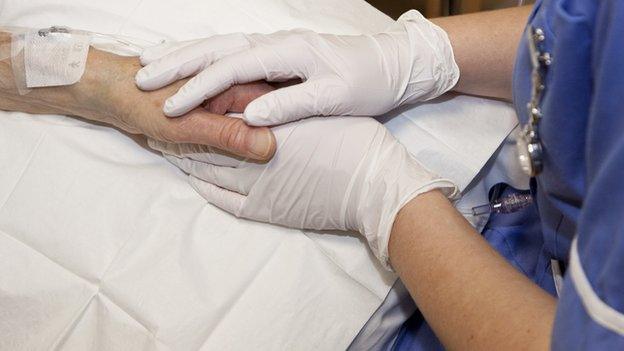NHS told to streamline 'complicated' complaints process
- Published

Healthwatch England's survey suggests people are unsure who to complain to
The complaints system for the NHS in England is "hopelessly complicated" and needs an overhaul, according to the patients' watchdog.
Healthwatch England says more than 70 organisations are involved in dealing with complaints about the NHS and social care.
It wants the process to be simplified to ensure patients get more support.
NHS England says it is committed to improving how complaints are handled and is piloting a new approach.
Several inquiries have highlighted failings in the complaints systems for health and social care, and the dangers of failing to heed patients' concerns.
Now Healthwatch England's review of the complaints system - based on public responses to its survey - has discovered there are up to 75 different types of organisation involved in the process.
Initially, health and care providers - including hospitals, GP practices and care homes - or their commissioning bodies can be challenged.
'Utterly bewildering'
Then there is a complex array of regulators, inspectorates, courts and committees that may get involved, meaning a single complaint can be passed between organisations.
If a patient is concerned about an unsafe discharge from hospital, for example, the complaint process might begin with the hospital or clinical commissioning group, before being escalated to the health service ombudsman if it cannot be resolved locally.
Alternatively, if there is a problem caused by failings in the social care system, the complaint might involve the care home provider - possibly a private company - the local authority responsible for overseeing provision and the local government ombudsman.
In cases of possible clinical negligence, the issue could go before the General Medical Council or General Nursing Council and might end up before the courts.
Healthwatch England says for patients the process is "utterly bewildering", and it wants a system where people raise a concern or make a complaint just once.
The watchdog says problems are being compounded by a lack of consistent and easy access to complaints support services.
'Significant change'
Its chairwoman, Anna Bradley, said: "It's no wonder the public are left confused and frustrated. With so many organisations involved it's difficult to know where to start, let alone having the strength and persistence to navigate the system on your own.
"There will need to be very significant change in the complaints system if it is to benefit from the intelligence and insight that complaints can offer and use it to drive real improvement for the people actually using services."
Julie Mellor, Parliamentary and Health Service Ombudsman said: "We agree with Healthwatch that the current complaints system is too complex and we are working with the Department of Health, NHS England and regulators to help people better understand where they need to go when they want to raise a concern."
Jane Cummings, chief nursing officer for England, said: "Our single most important purpose is to look after patients with compassionate care. That means delivering the best possible patient experience to every single patient, every single time.
"As part of this we must listen, take seriously and respond promptly, responsibly and openly to any complaint we receive. Poor complaints handling is unacceptable."
She said NHS England was developing a new approach so that patients could have complaints resolved "simply and effectively", without having to negotiate a complex system.
'Take action'
The warning comes soon after a review of NHS complaints in Wales was launched.
Health minister Mark Drakeford launched the 12-week review of the NHS complaints handling process in February to establish "what needs to improve".
It is being held as the current system, Putting Things Right, is almost three years old, the minister said.
In Scotland, there was a 13% rise in complaints against the NHS in 2012/13 compared to 2011/12.
- Published1 January 2014
- Published28 October 2013
- Published28 October 2013
- Published13 August 2013